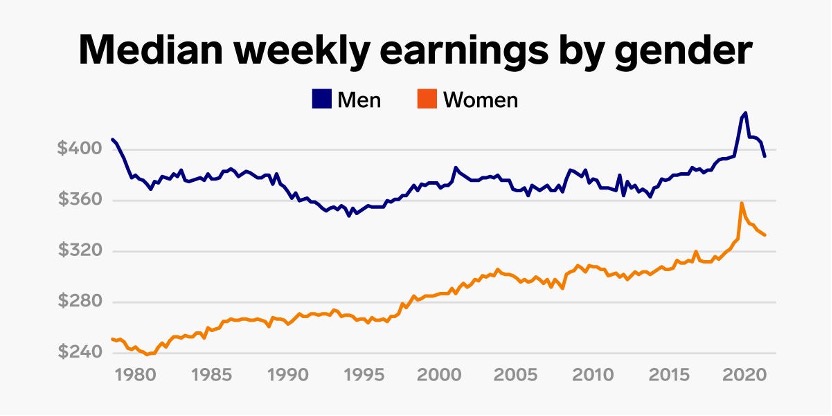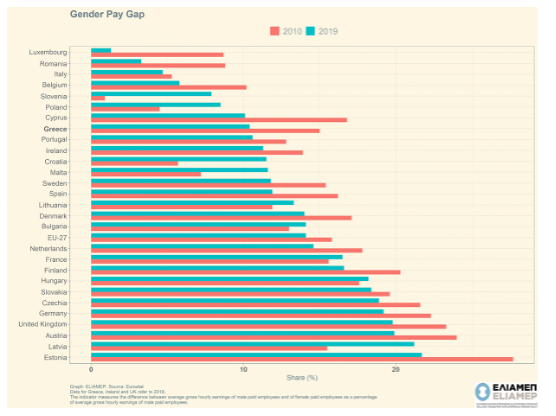By Sofia Mavrou,
Firstly, women fought to be able to get outside of the house not accompanied by a male presence. Later, for having access to the formal education males had for centuries. Then, for getting trained and entering the workspace next to the males. And now for being paid as a male worker would.
The gender pay gap or gender wage gap is the average difference between the remuneration for men and women who are working. In the USA the consensus is women have been paid less than men for over a century. On top of that, a worker who is a woman and also a colored one earns less than both categories (white women and men). According to the Institute for Women’s Policy Research, the wage gap between black women and white men is substantially larger than the 18.4 percent wage gap between all women and all men. Alongside black women, Native American women and Hispanic women have not been paid equally to non-Hispanic white women and men.

The first year with available data with respect to the wage gap is 1979. In previous years, the concept of the wage gap was such a realistic situation that they did not even consider tracking down the deviations.
Turning the loupe to Europe, the wage gap in 2020 was 13% in favor of males. And this is the best-case scenario. In 2019 men were paid 14.1% more than women in the same group did. In 2014 the gender pay gap reached 14.2%. In 2012, women earned less than men by 16.2%. If we narrow it down to one country’s data, the result is even more deviating. The record is held by Latvia where women are paid less than 22.3% than men per hour. Estonia comes second with a 21.1% gap between women’s and men’s wages. Then Austria and Germany follow with 18.9% and 18.3% relatively. Unfortunately, a European country that pays the same wage to men and women for the same amount of work does not exist. The country with the smallest gender wage gap is Luxemburg, with only a 0.7% deviation.

The causal components of the gender wage gap are dozens. Mostly, there are involved with the general disdain against women and their potential which is entangled with male thought since the Earth started revolving. In combination with racial discrimination and/or ethnic bias held by society, the average male had to find a way to retain his superiority. Cleverly, he came up with the financial subordination of women.
According to the European Commission, less than 8% of top companies’ CEOs are women. Generally speaking, the position one has in a company goes hand-in-glove with the amount of their remuneration. This notion links with the concept of the “Glass Ceiling”. As its name suggests, there are some invisible barriers that disqualify women or minorities from advancing in the workplace. For example, a requirement for overtime to get a promotion, but instead of approaching the promotion the worker becomes the object of exploitation. Also, the preconceptions of women’s work roles and abilities are far-rooted. To give you an idea, how many times have you watched a movie with a male secretary?
Gender conventions are so far ingrained in every facet of modern life that true parity can only be achieved with a complete overhaul of the current system. Indeed, the reformation of payment legislation takes time. Sadly, the time needed to pass from the theory to the practice far outweighs it. Some individuals blame themselves. Others break the “Glass Ceiling”. Others hesitate to recognize the predicament. Either way, the change is just around the corner, and intends to make a fuss.
References
- BLACK WOMEN TO REACH EQUAL PAY WITH WHITE MEN IN 2130, Institute for Women’s Policy Research. jstor.org. Available here
- The gender pay gap situation in the EU. europa.eu. Available here
-
Quick Facts about the Gender Wage Gap. americanprogress.org. Available here




